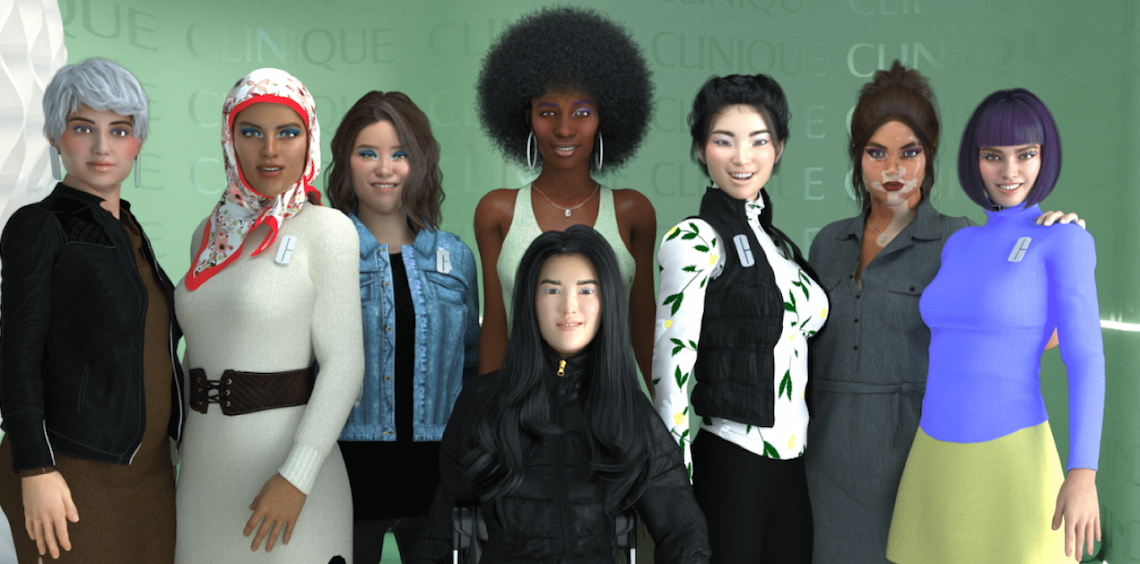On Wednesday, Clinique debuted its second Web3 initiative. This time, the brand is centering its focus on diversity and inclusion within the metaverse.
In a campaign called Metaverse Like Us, Clinique collaborated with three makeup artists, Tess Daly, Sheika Daley and Emira D’Spain, to design makeup looks for virtual avatars created by software company Daz 3D. Daz 3D has a diverse collection of 8,880 avatars, of which 66% are avatars of color and 16% have a disability. In three separate drops, between July and September, Clinique will release 1,968 complimentary digital makeup looks at a time to randomly selected Daz 3D avatar holders. Avatar holders will receive the looks in their digital wallets and can connect them to their avatar, if they choose, or can trade or sell them.
Clinique’s first foray into Web3 was launching an NFT art collection in Oct. 2021 that awarded people NFTs through sweepstakes they could enter by signing up for the brand’s loyalty program online.
“Different facets of the brand come true in every brand experience. We went after loyal consumers to celebrate and support them first,” said Carolyn Dawkins, svp of global marketing, analytics and online at Clinique. “This new [launch] is about saying to our new consumers and the next generation of consumers that we understand the importance of inclusion and diversity.”
As Glossy recently reported, the metaverse is not necessarily the most diverse space, but beauty brands like Nyx Cosmetics hope to foster inclusivity while Web3 is still in its nascent stages. As part of a multi-pronged Pride campaign, on June 16, Nyx Cosmetics will sell 8,430 digital NFT avatars representing BIPOC and LGBTQIA+ people. As more metaverse platforms appear and expand, there is more potential for beauty brands to take a diverse and inclusive approach.
“The way we see the metaverse is that avatars and NFTs will start to pour over to different [metaverse] spaces,” said Roxanne Iyer, vp of global consumer engagement at Clinique. “Instagram is making moves in this space, so we’re seeing other platforms [get involved]. There will be more portability across different platforms and metaverse worlds.”
Aligning itself with young consumers, technology and the values of the future has served Clinique well. It was called out in The Estée Lauder Companies’ third-quarter earnings in May for its double-digit growth in makeup. Its hero Black Honey lipstick notably received newfound fame on TikTok in Aug. 2021. Dawkins declined to share investment figures surrounding Metaverse Like Us but said that Clinique has carved out a separate bucket in its marketing budget for these types of initiatives.
Clinique’s first NFT campaign from Oct. 2021 was regarded as a success, said Dawkins, and led to a 20% increase in social media engagement. Organic search for Clinique increased by approximately 60%.
“The idea of leading in these [Web3] spaces is an interesting way to pull a consumer toward your brand and to fuel a modern perception of the brand,” she said.
Iyer added that Clinique wanted to ensure that there was a link between Clinique.com and the metaverse for its second launch. On Clinique.com, customers will be able to see the avatar renderings alongside the products that inspired the makeup looks and purchase them. Clinique began to tease Metaverse Like Us on Tuesday via a video clip on Instagram and an additional video and static photo on launch day. Most of the social strategy for Metaverse Like Us will focus on Instagram, said Dawkins.
“We’ll continue to make sure we stay focused on our mission to celebrate and be of service to all skin and that it’s translated in a way that our consumers can understand and participate,” said Iyer.




